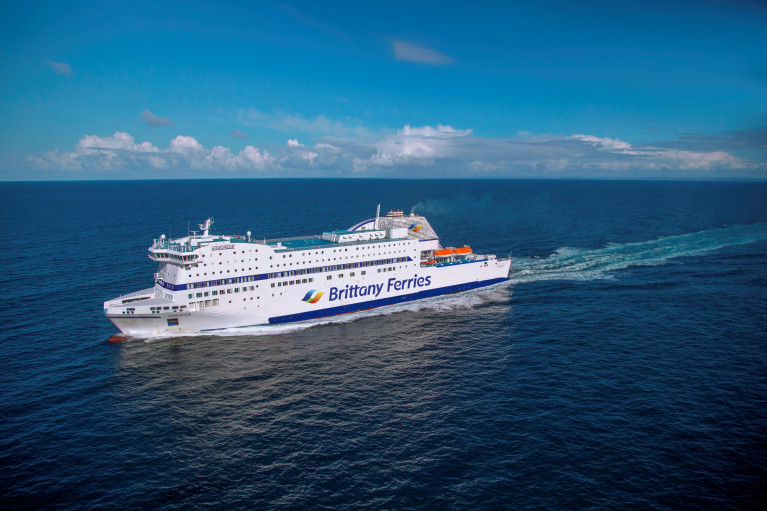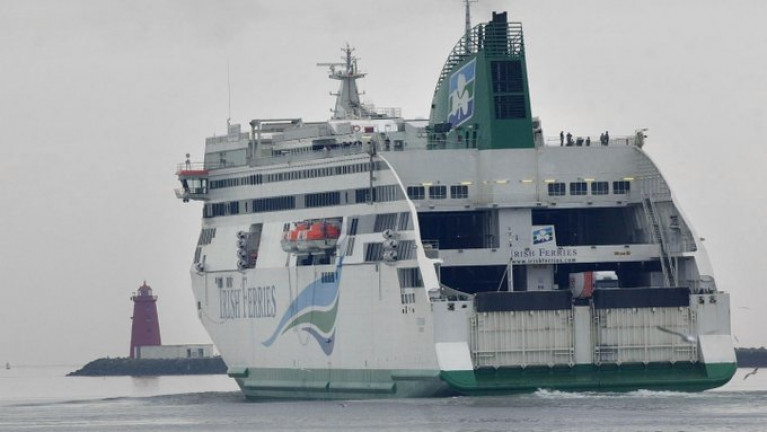Displaying items by tag: BypassBrexit
Bypass-Brexit Freight Ferry Bound for France Forced to take Rosslare-Ringaskiddy! Passage
As adverse weather impacted February, particularly Storm Darcy's disruption to Dublin Bay shipping, gales also affected Brittany Ferries new 'freight'-ferry network of Ireland-France operations, writes Jehan Ashmore.
It was during routine tracking this day last week, that Afloat noted with somewhat of a surprise that the French operator's cruiseferry Armorique, had sailed along the south coast from Rosslare Europort to Ringaskiddy in Cork Harbour.
With such inclement weather, Afloat speculated that this was the cause of Armorique's repositioning passage from Leinster to neighbouring Munster. This was indeed the situation as Afloat contacted Brittany Ferries to confirm to the related 'Bypass-Brexit' routes that avoid the UK land-bridge.
A spokesperson from the operator's UK office commented that Armorique’s 20.00 Rosslare-St Malo sailing (last) Thursday and the 20.00 St. Malo-Cork sailing the next day, 19th February, were both cancelled due to the weather.
(These cancelled 'evening' sailing times are shown in bold below from the new freight routes/ added sailing schedule Afloat previously reported).
So given the weather impact on Armorique's four route network roster, this led the 2009 custom built ferry, having to sail in 'ballast' when sailing off the Wexford, Waterford and Cork coasts. The arrival to the southern city port was to retain to the scheduled route roster, with the 18.00 Cork-Roscoff sailing taking place on 20th February.
Day Depart Time Arrive Time (next day)
Monday Roscoff 20:00 Cork 14:00
Tuesday Cork 20:00 Roscoff 14:00
Wednesday Roscoff 20:00 Rosslare 14:00
Thursday Rosslare 20:00 St Malo 17:10
Friday St Malo 20:00 Cork 15:00
Saturday Cork 18:00 Roscoff 12:40
Given the topic of weather, hence the caveat in this timetable to cite sailings subject to weekly variation and change as Afloat previously reported in advance of the inaugural sailing of the new routes/additional service sailings through Rosslare and Cork.
A week later and today, sees Armorique in Rosslare with a scheduled sailing (this evening at 20.00) along with in port, Isle of Inishmore and Stena Estrid. The E-Flexer ropax last month opened a new Dublin-Cherbourg service but is understood to be off service temporarily to cover Rosslare-Cherbourg ropax Stena Horizon. This smaller ropax is this winter's Irish Sea relief ferry while the Stena fleet are overhauled in dry-docks.
In all the years reporting for Afloat's 'Ferry' News, Armorique's role in operating to such a route rotation involving four routes and between just two nations (Ireland-France) is easily the most intense and complex. The same operator's flagship Pont-Aven on the Cork-Roscoff route (due to reopen in mid-May), which traditionally continues beyond France, by linking Brittany to the UK and from there a UK-Spain route before returning in reverse on this three-route network connecting four nations.
In the previous decades of the '80 and '90's, Irish Ferries operated longer (Rosslare/Cork routes to France), but not to the extent of Armorique's solo running role, as the Irish ferry operator had the use of two ships serving three routes, among them Cork-Cherbourg. The French port is the main ro-ro Brexit-Bypass transport hub for freight hauliers requiring convenient links to EU member state nations and beyond.
Irish Ferries however currently operate the Dublin-Cherbourg route where ropax Epsilon and another chartered in ferry, Mega Express Four provide additional Bypass Brexit services. The latter ferry also runs on the Dublin-Holyhead route with W.B. Yeats taking the roster of Ulysses which is in overhaul.
Afloat will also delve further into these direct Ireland 'continental mainland' routes (briefly dipping into the past) and those of the present.
Shipping Lines in Light of Brexit will Set up New Routes to Europe to Meet Demand, Says IMDO
Companies in the shipping industry, reports The Irish Times, will respond to “unanswered demand” for more direct ferry services to mainland Europe if Brexit congests the key UK “landbridge” route, the State’s maritime development agency said.
Hauliers have said the increased frequency of sailings between Ireland and Cherbourg in France to a daily service from January was welcome but that it would not serve as a substitute to the speed and ease of transit currently, before Brexit comes into effect, over the landbridge.
Liam Lacey, director of the Irish Maritime Development Office (IMDO), urged importers and exporters shipping goods to and from Europe to “trial” direct routes between now and January when Brexit border checks begin to see if they work as alternatives for their supply chain.
EU-UK border checks from January mean that transport companies and hauliers face delays at British ports on the Irish Sea and English Channel, potentially disrupting the fastest and cheapest transit route currently between Ireland and mainland Europe.
Mr Lacey acknowledged that Brexit-related delays on the landbridge, jeopardising time-sensitive cargos, could force companies to change their business models and supply chains.
“I don’t underestimate the difficulty about that,” he said. “People need to understand that they will have to consider changing the way they operate. It might be a short-lived thing until the landbridge settles down but we just don’t know that.”
More here from the newspaper and a response from the Freight Transport Association of Ireland as Afloat also reported yesterday.

























































